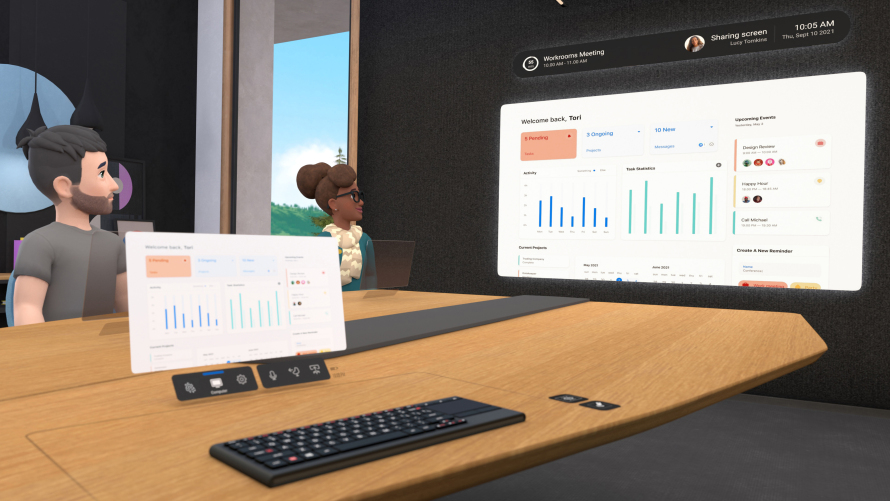
Facebook’s new VR remote work app is a step closer to ‘metaverse’. Source: Facebook
Facebook’s VR remote work app is a step closer to the metaverse
- Horizon Workrooms is Facebook’s first major step toward Mark Zuckerberg’s envisioned metaverse, an all-encompassing alternate reality that blends the real world with digital imaginations and enhancements.
- The company reiterates that it would not use people’s work conversations and materials in Workrooms to target ads on Facebook.
- Workrooms support up to 50 people on a call, 16 of whom can be in full VR.
A couple of weeks ago, Facebook’s CEO Mark Zuckerberg let the public in on his metaverse ambitions. He wants Facebook to be known as a “metaverse company” and just a week ago, we got a look at where the social media behemoth’s first foray on this journey is — a virtual conference room.
Claiming his new method of interaction could soon become the future workspace, Facebook launched a test of a new virtual-reality remote work app where users of the company’s Oculus Quest 2 headsets can hold meetings as avatar versions of themselves.
The beta test of Facebook’s Horizon Workrooms app comes as many companies continue to work from home after the pandemic shut down physical workspaces on top of the new variant sweeping across the globe.
This, evidently, isn’t Facebook’s first foray into this space. In fact, the world’s largest social network has been heavily investing in virtual and augmented reality, developing hardware such as its Oculus VR headsets, working on AR glasses and wristband technologies, and buying a bevy of VR gaming studios, including BigBox VR.
It has allowed Facebook to gain dominance in this space, which Facebook bets will be the next big computing platform. According to them, it will allow the company as a whole to be less reliant in the future on other hardware makers, such as Apple Inc.
A look into Facebook’s Horizon Workrooms app
Firstly, the term “metaverse,” coined in the 1992 dystopian novel “Snow Crash,” is used to describe immersive, shared spaces accessed across different platforms where the physical and digital converge. Zuckerberg has described it as an “embodied internet.”
Considering it may just be the next big computing platform, the metaverse has been referenced in several recent earnings calls by tech CEOs including Zuckerberg, Microsoft Corp’s Satya Nadella, gaming company Roblox Corp’s David Baszucki, and Match Group Inc’s Shar Dubey. In general, they talked about how their companies could shape aspects of this futuristic realm.
In its first full VR news briefing, the company showed how Workrooms users can design avatar versions of themselves to meet in virtual reality conference rooms and collaborate on shared whiteboards or documents, still interacting with their own physical desk and computer keyboard. The app, free through the Quest 2 headsets which cost about US$300, allows up to 16 people together in VR and up to 50 total including video conference participants.
Facebook’s vice president of its Reality Labs group, Andrew Bosworth, said the new Workrooms app gives “a good sense” of how the company envisions elements of the metaverse. “This is kind of one of those foundational steps in that direction,” Bosworth told reporters during a VR news conference. He also mentioned that Facebook was now using Workrooms regularly for internal meetings. Additionally, a beta version of Workrooms was made available for download in the Oculus store.
Spatial audio processing renders your colleagues’ voices closer or farther away depending on how close you’re “seated” to one another in virtual space. It is made up of several components that replicate activities you would do in an actual office and allows for multiple participants to join via VR or video.
The company also highlighted that it would not use people’s work conversations and materials in Workrooms to target ads on Facebook by them or other third-party apps. It also said users must follow its VR community standards and that rule-breaking behavior can be reported to Oculus. Workrooms support up to 50 people on a call, 16 of whom can be in full VR.
READ MORE
- The criticality of endpoint management in cybersecurity and operations
- Ethical AI: The renewed importance of safeguarding data and customer privacy in Generative AI applications
- How Japan balances AI-driven opportunities with cybersecurity needs
- Deploying SASE: Benchmarking your approach
- Insurance everywhere all at once: the digital transformation of the APAC insurance industry


